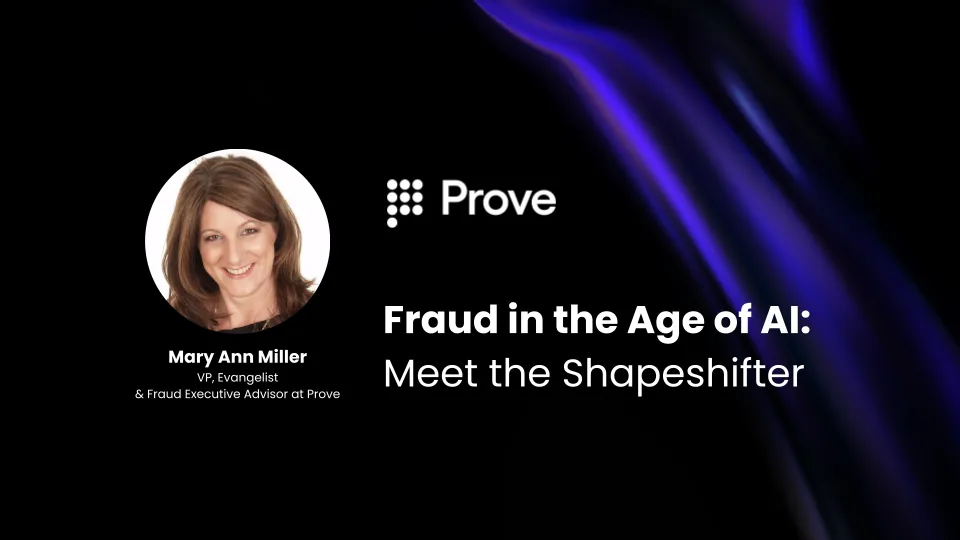AI
 Read our Blog: Prove Launches Verified Agent Solution to Secure the $1.7 Trillion Agentic Commerce Revolution
Read our Blog: Prove Launches Verified Agent Solution to Secure the $1.7 Trillion Agentic Commerce RevolutionProve launches Prove Verified Agent to secure the emerging $1.7 trillion agentic commerce market. This solution provides a new trust framework by cryptographically binding verified identity, intent, payment credentials, and consent for autonomous agents. Learn how Prove's frontier digital identity framework enables safe, scalable, and fraud-resistant agent-driven transactions.
 Read our Blog: Prove, AWS, and Fraud Experts Discuss Efforts at Fielding Fraud in the Age of AI
Read our Blog: Prove, AWS, and Fraud Experts Discuss Efforts at Fielding Fraud in the Age of AIProve and AWS recently pulled their collective team efforts onto the field to host Play Ball: Fielding Fraud in the Age of AI.
 Read our Blog: Prove’s Mary Ann Miller Featured in TechRepublic Panel About Addressing Cyberattacks With AI
Read our Blog: Prove’s Mary Ann Miller Featured in TechRepublic Panel About Addressing Cyberattacks With AIAI tools can autonomously generate threat detection queries, sift through vast amounts of data, and pinpoint potential threats without manual intervention.
 Read our Blog: Fraud in the Age of AI: Meet the Shapeshifter
Read our Blog: Fraud in the Age of AI: Meet the Shapeshifter The COVID-19 pandemic not only changed the way we work and live, it also unleashed a wave of fraud unlike anything we've seen before.
 Read our Blog: Introducing Prove Link™ – Unlocking the Power of Identity for Any Business
Read our Blog: Introducing Prove Link™ – Unlocking the Power of Identity for Any Business To continue achieving our mission of accelerating trusted interactions on the internet, we’re proud to announce the introduction of the Prove developer self-service platform and the Prove LinkTM SDK. With these tools, it’s now faster and easier for any company to integrate our industry-leading identity technology into its brand operations.
 Read our Blog: Prove’s Fraud Experts Offer Solutions to Rising Deepfake Issues
Read our Blog: Prove’s Fraud Experts Offer Solutions to Rising Deepfake IssuesIn the article, Mary Ann Miller, Prove’s VP of Client Experience, and Tim Brown, Prove's Global Identity Officer, emphasized the critical importance of establishing and verifying the origin of media using cryptographic methods.
 Read our Blog: What is AI-Based Fraud & How Can Digital Identity Help?
Read our Blog: What is AI-Based Fraud & How Can Digital Identity Help?Artificial intelligence-based fraud, also known as AI-based fraud, refers to fraudulent activities or scams that are facilitated or enhanced by the use of artificial intelligence (AI) technologies, which is the science of simulating human intelligence and problem-solving skills in machines.
 Read our Blog: U.S. News & World Report Features Recent Prove Report on Online Shopping & AI-Based Fraud
Read our Blog: U.S. News & World Report Features Recent Prove Report on Online Shopping & AI-Based FraudU.S. News & World Report recently published a comprehensive blueprint for stopping digital shopping scams for this holiday season. Their 14 specific recommendations rely heavily on insights and advice from a recent report released by Prove.











